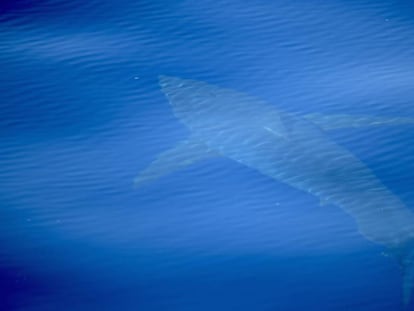Experts cast doubt on white shark sighting in Spanish waters
Biologists consulted by this newspaper say it is more likely to be a shortfin mako shark
The first white shark sighting in 30 years in Spanish waters, an event that made headline news last Friday, is now surrounded by a sea of doubt. All the experts consulted by EL PA?S agreed that the specimen discovered last week eight nautical miles off the coast of Cabrera, in the Balearic Islands, is in fact not a white shark (Carcharodon Carcharias), but a shortfin mako (Isurus Oxyrinchus).
Experts also doubted that the animal sighted by the conservation group Alnitak really measures five meters in length as originally reported. There is consensus that the organization rushed to make their findings public without first sharing all their footage with other experts, a step that they have pledged to take now.
If, in the end, it is a five-meter shortfin mako, biologically it would almost be even more spectacular
Fernando L¨®pez-Mirones, documentalist and biologist
The images of the shark have spread like wildfire within the scientific community ever since Alnitak published its findings on Facebook last Thursday. ¡°At first sight, after seeing the images, I already had serious doubts that I was seeing a white shark. Now, having seen part of the video,? I am inclined to believe that it is actually a shortfin mako, a species seen more frequently in the Mediterranean. I also do not think, despite what has been said, that this specimen measures five meters. However, we must be thorough and view more images,¡± explains Gonzalo Mucientes, a shark expert and biologist at the CBIO research center at the University of Porto in Portugal.
Mucientes has recently been in contact with other colleagues who have also cast serious doubts on the discovery. ¡°It¡¯s a mako,¡± concludes another expert biologist, who prefers to remain anonymous. ¡°It¡¯s hard to contradict your colleagues, but we can¡¯t be politically correct. The news has had worldwide coverage and we have to tell the truth. They rushed into making an announcement and didn¡¯t consult other sources beforehand. All the colleagues who have seen this video think the same way,¡± he adds.
¡°The quick movements of the animal lead me to believe that it is shorter than five meters,¡± explains Mucientes. ¡°As for the morphology, the snout is pointed, long and sharp, like that of a mako. The coloring, especially the absence of dark spots under the pectoral fins, is a feature that is not shared with the white shark.¡±
I am inclined to believe that it is actually a shortfin mako, a species seen more frequently in the Mediterranean
Gonzalo Mucientes, shark expert
Both species, says this expert, belong to the same family of sharks (Lamnidae), and a young white shark can be quite similar to a shortfin mako adult, which could have led to the mix-up on the expedition led by Ricardo Sagarminaga, who announced the historic finding barely hours after recording the specimen.
International experts
Sagarminaga and his colleague, the biologist and documentary-maker Fernando L¨®pez-Mirones, claim that they are consulting with international experts and reject the reaction by some fellow biologists who have ventured to give a firm answer based on a photograph and a few seconds of video footage. ¡°If we cannot be 100% sure that it is a white shark, then we cannot be 100% sure that it is a shortfin mako,¡± states L¨®pez-Mirones, who insists that the photograph does not do justice to the real size of the creature.
¡°We have a purely scientific interest in this and we don¡¯t have a problem sharing all the material that we have collected with the experts who demand it. If, in the end, it comes down to a five-meter shortfin mako, biologically it would almost be even more spectacular,¡± points out the documentary-maker, who underlines that he, like Sagarminaga, is a biologist and was able to attest to the length of the creature.
After seeing the images, Claudio Barr¨ªa, a biologist specializing in sharks at the Institute of Marine Sciences (ICM) in the Balearic Islands, agrees with Mucientes that the characteristics of the specimen are more similar to those of a mako, considered the fastest shark on the planet (it is able to reach speeds of more than 120km/h). ¡°The coloring, the pectoral fins and the pre-caudal keels also give room for thought¡±, says Barr¨ªa.
The International Union of Nature Conservation has catalogued around 30 shark species in the Balearic Islands including the blue shark, the basking shark and the thresher shark, some of which are endangered species. During the last 30 years, the notion that there were white sharks in the Balearics has been fed by rumors and unconfirmed sightings. The largest white shark, and the last known one, was caught in 1976 by a fisherman named Xisco L¨®pez, who found a specimen over six meters in length in the area of Cape Farrutx. Seven years earlier, another fisherman named Guillem Ferragut had caught a six-meter specimen after it found its way into his tuna fishery at Bah¨ªa Azul, located to the south of the island. In the Mediterranean as a whole, the last white shark sighting took place in 2016 near a tuna fishery on the Tunisian coast.
On the other hand, the shortfin mako is a more familiar species off the coast of the Balearic Islands. In July 2016, in waters near Formentera, a fisherman recorded the presence of a specimen some 12 miles from the coast. Blue sharks have also made an appearance in recent summers, like last year when a sick specimen came close to the coasts of Palma and Calv¨¬a and had to be put down. Another blue shark sparked panic when it came close to the shore at Illetes beach while a third forced Colonia de Sant Jordi to fly a red flag on its beach.
English version by John Clarke.
Tu suscripci¨®n se est¨¢ usando en otro dispositivo
?Quieres a?adir otro usuario a tu suscripci¨®n?
Si contin¨²as leyendo en este dispositivo, no se podr¨¢ leer en el otro.
FlechaTu suscripci¨®n se est¨¢ usando en otro dispositivo y solo puedes acceder a EL PA?S desde un dispositivo a la vez.
Si quieres compartir tu cuenta, cambia tu suscripci¨®n a la modalidad Premium, as¨ª podr¨¢s a?adir otro usuario. Cada uno acceder¨¢ con su propia cuenta de email, lo que os permitir¨¢ personalizar vuestra experiencia en EL PA?S.
?Tienes una suscripci¨®n de empresa? Accede aqu¨ª para contratar m¨¢s cuentas.
En el caso de no saber qui¨¦n est¨¢ usando tu cuenta, te recomendamos cambiar tu contrase?a aqu¨ª.
Si decides continuar compartiendo tu cuenta, este mensaje se mostrar¨¢ en tu dispositivo y en el de la otra persona que est¨¢ usando tu cuenta de forma indefinida, afectando a tu experiencia de lectura. Puedes consultar aqu¨ª los t¨¦rminos y condiciones de la suscripci¨®n digital.











































